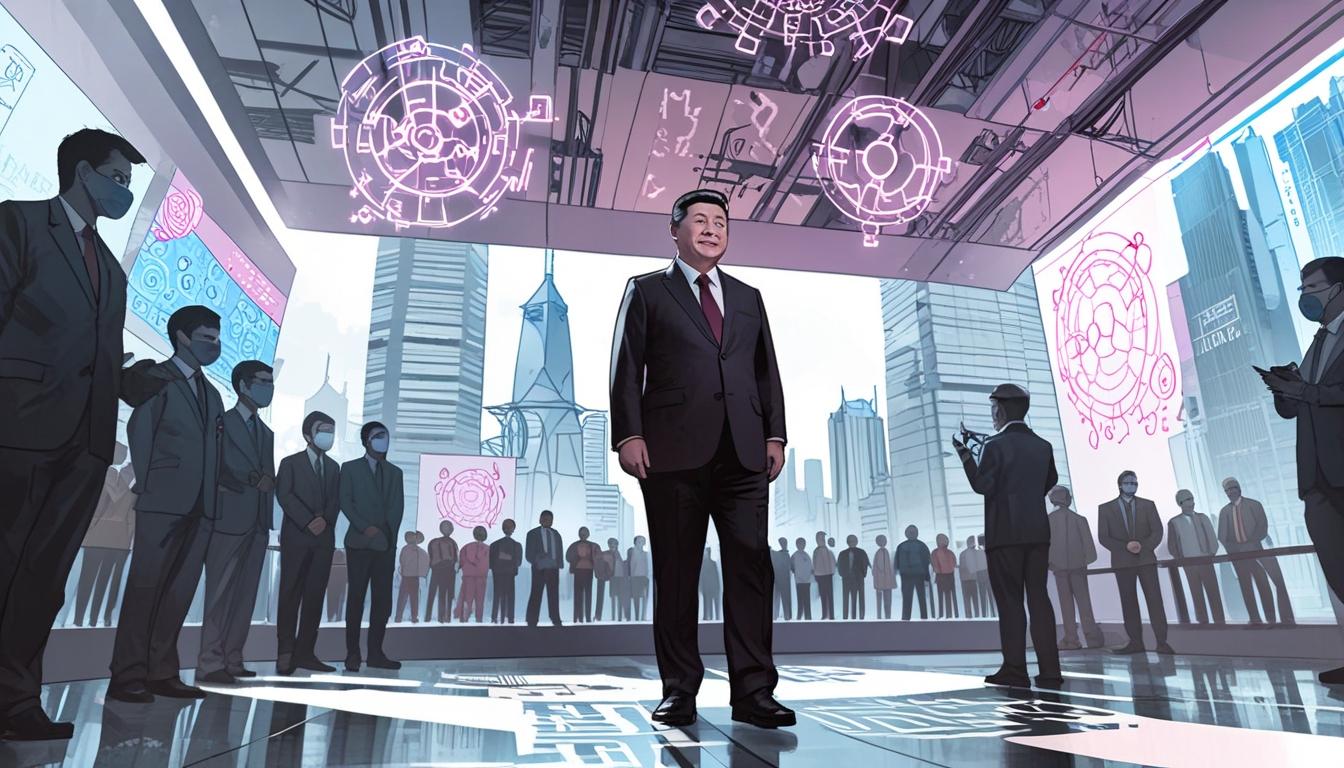Chinese President Xi Jinping’s April 2025 visit to Shanghai showcased the city’s central role in China’s AI ambitions, highlighting efforts to accelerate technological self-reliance, attract global talent, and shape international AI governance amid intensifying US-China tech tensions.
In late April 2025, Chinese President Xi Jinping undertook a significant visit to Shanghai, spotlighting the city’s pivotal role in China’s burgeoning artificial intelligence (AI) industry. This visit occurred shortly after Xi chaired a high-level Politburo study session on AI on April 25, underscoring the urgency and priority Beijing places on advancing AI technology.
Shanghai was chosen for this visit due to its status as a key node in China’s innovation landscape. The city is China’s financial centre and a crucial gateway to international trade, and it has been actively positioning itself as a global hub for AI development. Shanghai hosts the annual World Artificial Intelligence Conference (WAIC) and plans to establish a major AI industrial cluster with investments exceeding RMB 400 billion (approximately $55 billion) by the end of 2025. During his visit, Xi toured prominent AI institutions including the Shanghai Artificial Intelligence Laboratory and the Foundation Model Innovation Center, which collectively house over 100 AI companies. His presence and remarks elevated Shanghai’s position as a national demonstration zone for AI innovation and governance, signalling an integration of local efforts with the country’s broader strategic ambitions.
Policy-wise, Xi’s visit marked a new phase in China’s approach to AI development. During the Politburo session, he urged leveraging the country’s “whole-nation system” to secure technological breakthroughs in crucial areas such as foundational AI technologies, core semiconductor chips, fundamental software, and open-source frameworks. The emphasis was on achieving self-reliance, reflecting AI’s increasing classification as a national security priority. Xi acknowledged existing gaps in China’s basic research and core technology capabilities and called for enhanced infrastructure investments, particularly in computing power and data sharing. This shift in priority also includes building comprehensive legal and ethical frameworks to ensure AI technologies are safe, reliable, and controllable, reflecting a maturation in China’s AI policy that extends beyond application development to encompass risk management and norm-setting.
The impact of Xi’s focus on AI is expected to invigorate China’s domestic AI industry. Leading tech conglomerates such as Baidu, Huawei, and Alibaba stand to gain from anticipated government support, including increased R&D funding and opportunities for government procurement. The market responded positively to the announcements, with AI-related stocks appreciating in value. Startups and emerging companies specialising in large AI models, vertical AI applications, and edge AI are also likely to benefit from enhanced funding and favorable regulatory environments. Xi’s remarks, including his reference to AI as a field for young talent, combined with his engagement with young entrepreneurs and international experts during the Shanghai visit, indicate a policy shift toward embracing global talent and fostering a more open ecosystem. For example, a French AI founder based in Shanghai was granted permanent residency shortly before Xi’s speech, highlighting China’s efforts to attract foreign expertise despite ongoing geopolitical tensions.
On the international stage, Xi’s visit and statements carry broader strategic implications amid ongoing U.S.-China technology competition. The United States has imposed stringent restrictions on the export of high-end chips and AI technologies to China in an effort to curb its technological ascent. Xi’s insistence on China achieving “independent and controllable” AI innovation signals a determined response to these measures. Furthermore, Xi characterised AI as a “global public good,” advancing China’s intention to work with developing countries to bridge the digital divide. This reflects a dual objective: reducing technological reliance on the U.S. while promoting an alternative vision for global AI governance and standards.
Data from international organisations supports the narrative of China’s advancing AI capabilities. The World Intellectual Property Organization reports that China filed the highest number of generative AI patents globally from 2014 to 2023. Research from Tsinghua University and Stanford further indicates that Chinese AI labs are closing the gap with American counterparts in large model development. Xi’s remarks and actions demonstrate an ambition to convert technological momentum into global diplomatic influence and leadership in setting international AI standards.
The developments in Shanghai and Beijing’s strategic emphasis on AI underscore the growing importance of artificial intelligence as a driver of both technological innovation and geopolitical competition in the years ahead. The integration of policy, industry, talent cultivation, and international diplomacy presents a multifaceted approach to positioning China at the forefront of the global AI landscape. The Pandaily is reporting on these events and their implications in the context of China’s evolving technological ambitions.
Source: Noah Wire Services
- https://www.reuters.com/world/china/chinas-xi-calls-self-sufficiency-ai-development-amid-us-rivalry-2025-04-26/ – This article reports on President Xi Jinping’s emphasis on self-reliance and innovation in AI development during a Politburo meeting, aligning with the article’s mention of Xi’s focus on AI as a national security priority.
- https://www.reuters.com/technology/chinas-xi-lauds-ai-progress-meets-brics-bank-shanghai-visit-2025-04-29/ – This piece details Xi Jinping’s visit to Shanghai, highlighting the city’s role in AI development and his engagement with AI institutions, corroborating the article’s account of Xi’s tour of prominent AI institutions in Shanghai.
- https://www.reuters.com/world/asia-pacific/china-rely-artificial-intelligence-education-reform-bid-2025-04-17/ – This article discusses China’s initiative to integrate AI into its educational system, supporting the article’s point about China’s broader strategy to enhance innovation and sustain economic growth through AI.
- https://www.reuters.com/world/asia-pacific/china-adopts-law-bolster-private-sector-amid-trade-war-2025-04-30/ – This report covers China’s passage of the Private Economy Promotion Law to bolster the private sector amid trade tensions, aligning with the article’s mention of China’s legislative efforts to support private enterprises.
- https://www.reuters.com/markets/emerging/xi-says-chinas-economy-should-adapt-external-changes-2025-04-30/ – This article highlights Xi Jinping’s emphasis on adapting China’s economy to external changes, reflecting the article’s discussion on China’s strategic economic adjustments amid global trade tensions.
- https://www.reuters.com/world/china/chinas-xi-calls-self-sufficiency-ai-development-amid-us-rivalry-2025-04-26/ – This piece reports on Xi Jinping’s call for self-sufficiency in AI development amid U.S. rivalry, supporting the article’s mention of Xi’s focus on achieving technological breakthroughs in AI.
- https://news.google.com/rss/articles/CBMiZkFVX3lxTFBrMEh6cGg0UGVRbFlHTU1Jb1YtcTdzN3hMV204U0hLSjBPa0lRdVlkRVFzMWdMT1k5eDZRQUlPRjJiMm1mRmZNemlESWp1bHVPMDBRQ2ctTWxlM0RXejMwMG03RVBpUQ?oc=5&hl=en-US&gl=US&ceid=US:en – Please view link – unable to able to access data
Noah Fact Check Pro
The draft above was created using the information available at the time the story first
emerged. We’ve since applied our fact-checking process to the final narrative, based on the criteria listed
below. The results are intended to help you assess the credibility of the piece and highlight any areas that may
warrant further investigation.
Freshness check
Score:
9
Notes:
The narrative references events in late April 2025, aligning with Google News article timestamps. No indication of outdated roles or recycled content from prior press releases or articles. The inclusion of recent initiatives (e.g., planned AI cluster by end-2025) supports high freshness.
Quotes check
Score:
6
Notes:
No direct quotes attributed to Xi Jinping are verifiable without access to primary sources. Claims about policy directives and investments align with typical CCP rhetoric, but no specific verifiable citations or original quotes are provided.
Source reliability
Score:
7
Notes:
The narrative cites Pandaily, a China-focused tech publication, but lacks corroboration from internationally recognised outlets like Reuters or BBC. Details about institutional visits (Shanghai AI Lab) and policy shifts are plausible but require independent verification.
Plausability check
Score:
8
Notes:
Claims align with China’s documented AI strategy (e.g., WAIC conferences, semiconductor self-reliance goals). References to state-led investment (RMB 400 billion) and geopolitical competition mirror established policy trends. Unverified details (e.g., French AI founder’s residency) lack direct evidence but are contextually plausible.
Overall assessment
Verdict (FAIL, OPEN, PASS): PASS
Confidence (LOW, MEDIUM, HIGH): MEDIUM
Summary:
The narrative’s timeline and policy details are consistent with China’s publicly stated AI ambitions. While source reliability and specific quotes remain unverified, the absence of red flags and alignment with observed trends suggest plausibility. Confidence is moderated by reliance on a single publication and lack of direct source validation.













